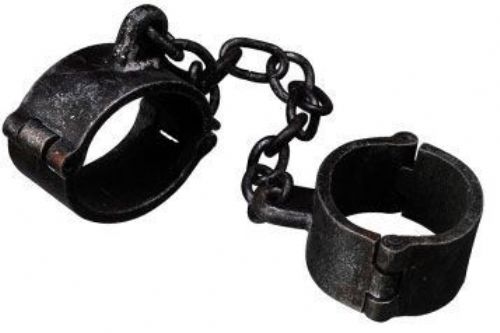Does the Bible teach that slavery is acceptable?
Many times, critics of the Bible will point to certain passages in the Torah to show that, if God exists, He must be immoral. Slavery is one of the themes they often use. They equate the past horrors of slavery in the United States’ early history with the Torah’s use of slavery. But is this an accurate comparison?
To be sure, a whole volume could be written on this subject alone, but for now we will only take a fast overview of the topic. First let us start with the word “slave” itself. In Hebrew the word is עֶבֶד (Ebed) and it is used over 800 times in the Hebrew Bible. A few translations are “manservant,” “slave” or “bondservant.”
Some points to be made:
1) The word “ebed” is used to describe people who are “servants” of God. Moses is described as a “servant/ebed” of God (Exodus 14:31). In Psalm 18:1, David is called the “servant/ebed” of God. As a matter of fact, the word “ebed” is used 56 times in the book of Psalms, almost always describing a believer who is a “servant/slave/ebed” of God. Do you think God treated Moses or David in the same way the American slave owners treated slaves?
2) The American slavery system was based upon kidnapping. Yet the Torah speaks of this action as a capital offense. “He who kidnaps a man and sells him, or if he is found in his hand, shall surely be put to death.” (Exodus 21:16). This would apply to anyone in the 1800’s who kidnapped an African person to ship him/her to the United States as a slave. In God’s eyes, this action is a capital offense, where the kidnapper should be put to death. Notice, the law makes no distinction between kidnapping a foreigner or an Israelite. Kidnappers are to be put to death, period.
3) Men or women were indeed allowed to “sell themselves” into “ebed” (slavery/servanthood) to pay off a debt. We call this “indentured servanthood” today. Sometimes this was voluntary, other times it was not. 2 Kings 4:1 tells us about a widow who asked Elijah for help. Her debts were so great, the creditor was coming to take her two sons as his “slaves/ebedim” to pay the debt. While this was unfortunate, debts do have consequences. However, this was certainly not the same as the American slavery system.
For some people today, joining the military can be the same principle of indentured servanthood. You need a job. You have bills to pay or a family to support. So you sign up with the military, who will pay your debts (in the form of a paycheck) in exchange for your 24/7 obedience to the military commanders. The military now has complete control of your life for four years. They tell you when to eat, when to sleep, what jobs to do, where you can and cannot go, etc. You are now a “slave/ebed” of the military if you choose this way out of debt. This is the same principle we see many times in scripture with the word “ebed.”
4) A foreign “slave/servant” was going to inherit the entirety of a very rich man’s estate. If we look at Genesis 24, Eliezer is Abraham’s eldest “servant/slave/ebed.” Yet in Genesis 15:3, Abraham complains to God that he has no child and Eliezer is set to inherit his entire estate? Let me remind you, Abraham was a very wealthy man. Where would you find this in the American slavery system? Yes, Eliezer was a “servant/slave/ebed,” but was more like a servant who had now become a family member. He would lawfully inherit everything. I have not heard of a single instance in the United States’ history of slavery where a slave inherits his master’s estate. That is because the two are not equivalent.
5) A foreign “slave” marries into the Israelite family. Look at the Biblical text: “Sheshan had no sons—only daughters. He had an Egyptian servant (Note: “ebed”) named Jarha. Sheshan gave his daughter in marriage to his servant Jarha” (1 Chronicles 2:34-35). Does this sound like the equivalent of the American slavery system? Was a slave in the 1800’s taken into the family as a son-in-law?
6) When their service (slavery/servanthood) was done, Hebrew servants were to be supplied liberally with gifts as a ‘going away’ present.
“If any of your people—Hebrew men or women—sell themselves to you and serve you six years, in the seventh year you must let them go free. And when you release them, do not send them away empty-handed. Supply them liberally from your flock, your threshing floor and your winepress. Give to them as the Lord your God has blessed you. Remember that you were slaves in Egypt and the Lord your God redeemed you. That is why I give you this command today.” (Deuteronomy 15:12-15)
Were any slaves in the United States given ‘going away’ presents? Were they ever even allowed to ‘go away’?
7) The Jewish Apostle Paul says the law (meaning the Torah) was made to combat “lawless and rebellious” people. Included in that list whom he considers “lawless and rebellious” are slave-traders (1 Timothy 1:9-10).
As mentioned earlier, this is just a brief rebuttal to those who wish to say the Bible condones slavery – and compare it to the American slave system. That is not a fair comparison at all. Were there “slaves” or “servants” in ancient Israel? YES! Were they treated the same as the Southern masters treated their slaves? NO!
We have briefly shown that “slaves/servants” (even foreign ones) in ancient Israel could inherit their master’s property, could marry into the family, etc. Moses and David (among many others) are called “servants/slaves” of God. To try and say that the Bible condoned the slavery system of the early United States is comparing apples to oranges.
The word “slave” might be the same on paper, but the concept was not.






